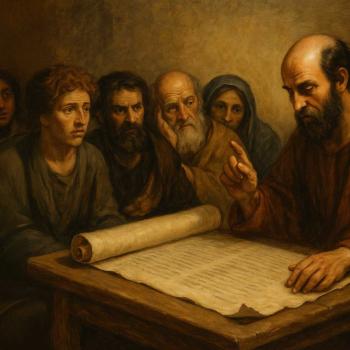I am in the process of making my first book, The Gospel (Victor Books, 1987), into an audio book. It is a single narrative harmony of the four New Testament gospels in the New International Version of the Bible, which is produced by Zondervan. BTW, my friend evangelist Billy Graham endorsed it by saying, “It may well become a classic.”
The first three NT gospels are called “synoptics” because they record many of the same acts and sayings of Jesus. There are both similarities and differences in these narratives, and this scenario is called “the Synoptic Problem.” That is, why are many of these accounts the exact same in places, and why are there dissimilarities as well? The Synoptic Problem has been by far the most studied issue in all of human literature.
To make an audio book of my book, The Gospel, I’m having to reformat it for Artificial Intelligence. I’m going to have Google Play make this audio book with their new Auto-Narration by means of AI. I’m impressed with the sound of the narration. Google Play is getting quite positive reviews of it. I’m now doing a final proof reading of my manuscript.
It is always so amazing to me when I read through the NT gospels for an extended period of time–but in this case having them joined together in a single reading–to be reminded of all the miracles, healings, and exorcisms that Jesus did in a period of perhaps only two to three years of his itinerant ministry. Of course, unbelievers deny that Jesus did such things, dismissing it as pure fiction. But when I read this material, I often notice various little things that indicate these written accounts–which are based on oral tradition of mostly illiterate people which developed over a period of years–are worth trusting.
Case in point: comparing Jesus and John the Baptist. John was Jesus’ cousin, being about six months older than Jesus (Luke 1.35-36). The man John left his home and lived alone in the desert region of Judea near the Dead Sea (Matthew 3.1). He began baptizing people in the Jordan River, calling on them to repent of their sins (vv. 5-6). The water symbolically indicated spiritual cleansing. But it also was a preparation for what was ahead. The message of both John and Jesus was, “Repent, for the kingdom of heaven is near” (Matt. 3.2; 4.17 NRSV). This statement is the center of my theology as I have indicated in some of my books and intend to show further in my future writings.
John the Baptist became very respected by many common people in Israel in those days. He had dared to speak out publicly against King Herod. We read, “Herod had arrested John, bound him, and put him in prison on account of Herodias, his brother Philip’s wife, because John had been telling him, ‘It is not lawful for you to have her.’ Though Herod wanted to put him to death, he feared the crowd, because they regarded him as a prophet” (Matt. 14.3-5).
When John the Baptist was born, his priestly “father Zechariah was filled with the Holy Spirit and spoke this prophecy: ‘Blessed be the Lord God of Israel, for he has looked favorably on his people and redeemed them. . . . And you, child, will be called the prophet of the Most High; for you will go before the Lord to prepare his ways'” (Luke 1.67-68, 76). Then Luke adds, “The child grew and became strong in spirit, and he was in the wilderness until the day he appeared publicly to Israel” (v. 80).
Because John the Baptist was gaining a following of penitent people coming out in the wilderness to be baptized by him, he was sometimes asked by religious leaders about his identity. For we read, “This is the testimony given by John when the Jews sent priests and Levites from Jerusalem to ask him, ‘Who are you?’ He confessed and did not deny it, but confessed, ‘I am not the Messiah.’ And they asked him, ‘What then? Are you Elijah?’ He answered, ‘No.’ They they said to him, ‘Who are you? Let us have an answer for those who sent us. What do you say about yourself?’ He said, ‘I am the voice of one crying out in the wilderness, Make straight the way of the Lord,’ as the prophet Isaiah said” (John 1.19-23; cf. Isaiah 40.3).
Jesus had been a tradesman all his adult life until he was thirty years old, living in Nazareth of Galilee in the north, working as a stone mason and carpenter. He then made the huge decision of abandoning his comfortable family life, with four brothers and multiple sisters, and joined John the Baptist at the Jordan River. John baptized Jesus. Then, both of them were conducting a baptizing ministry there.
One day, as Jesus was walking toward John the Baptist, he declared, “Here is the Lamb of God who takes away the sin of the world! This is he of whom I said, “After me comes a man who ranks ahead of me because he was before me'” (John 1.29-30). John added, “I myself have seen and have testified that this is the Son of God” (v. 34; cf. v. 36).
Then Herod had John imprisoned and eventually beheaded (Matt. 14.6-12). Jesus then, before the disciples, eulogized John the Baptist by saying of him, “Truly I tell you, among those born of women no one has arisen greater than John the Baptist” (Matt. 11.11). So, John had a great reputation.
Indeed, Jesus later silenced his adversaries by asking them this question, “‘Did the baptism of John come from heaven, or was it of human origin?’ They discussed it with one another, saying, ‘If we say, “From heaven,” he will say, “Why did you not believe him?” But if we say, “Of human origin,” all the people will stone us; for they are convinced that John was a prophet'” (Luke 20.4-6).
After John had been imprisoned, Jesus had embarked upon his itinerant ministry which included miracles, healings, and exorcisms, none of which the reputable John the Baptist had done. For we read about Jesus’ ministry, “He went away again across the Jordan to the place where John had been baptizing earlier, and he remained there. Many came to him, and they were saying, ‘John performed no sign, but everything that John said about this man was true.’ And many believed in him there” (John 10.40-42).
The NT gospels asserting constantly that Jesus performed many miracles, healings, and exorcisms, yet it never attributing any of these things to John the Baptist, moreover even stating expressly that he never did them, says volumes to me about the trustworthiness of these biblical accounts. If these gospel accounts about Jesus’ supernatural power is just mere fiction, surely the same stuff, though perhaps less of it, would have been attributed to the reputable John the Baptist as well. But no, it was not! And I think this is just another reason why we can trust these gospel accounts, which I think Christians rightly regard as divine scripture which has come from God.














